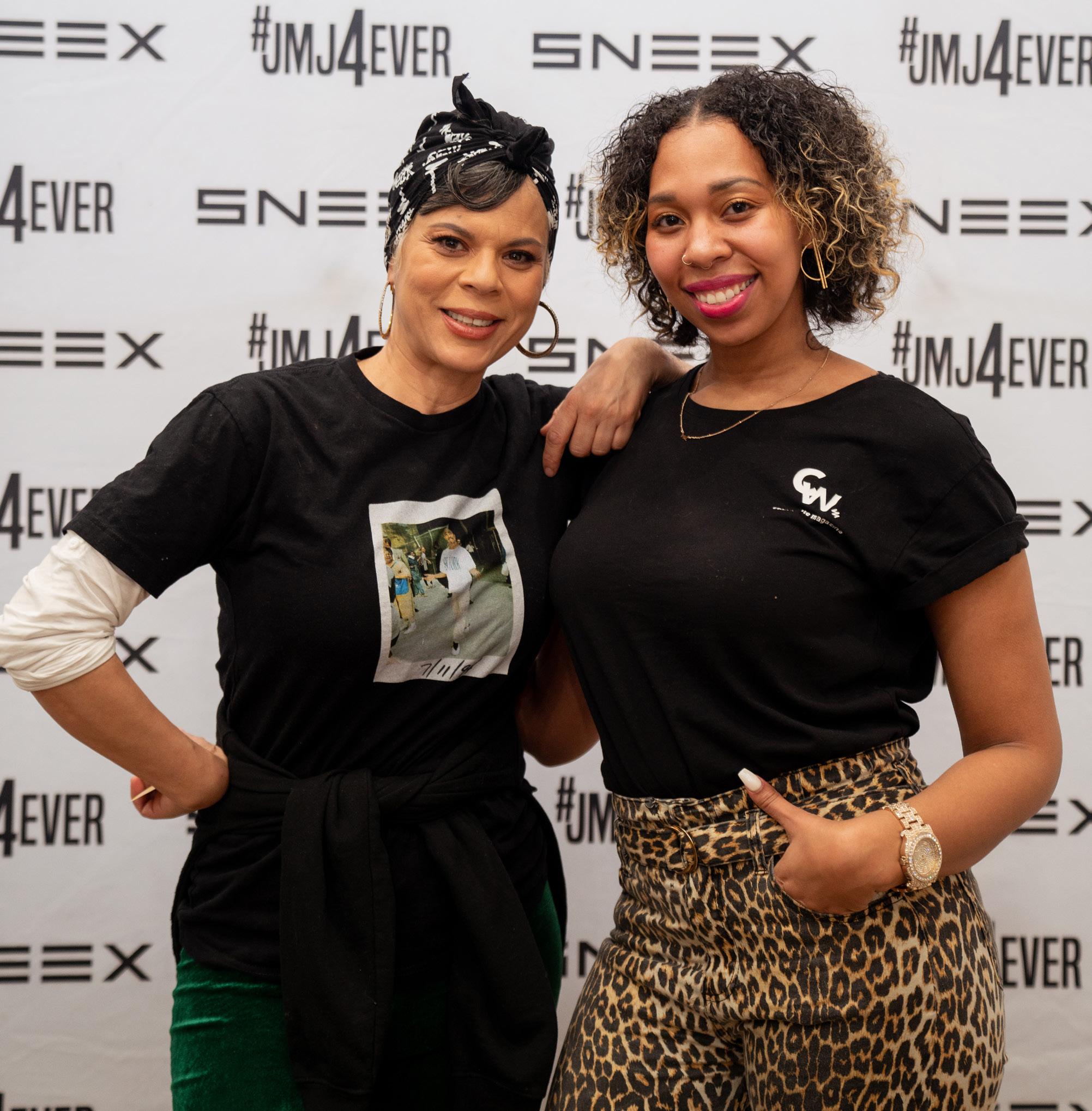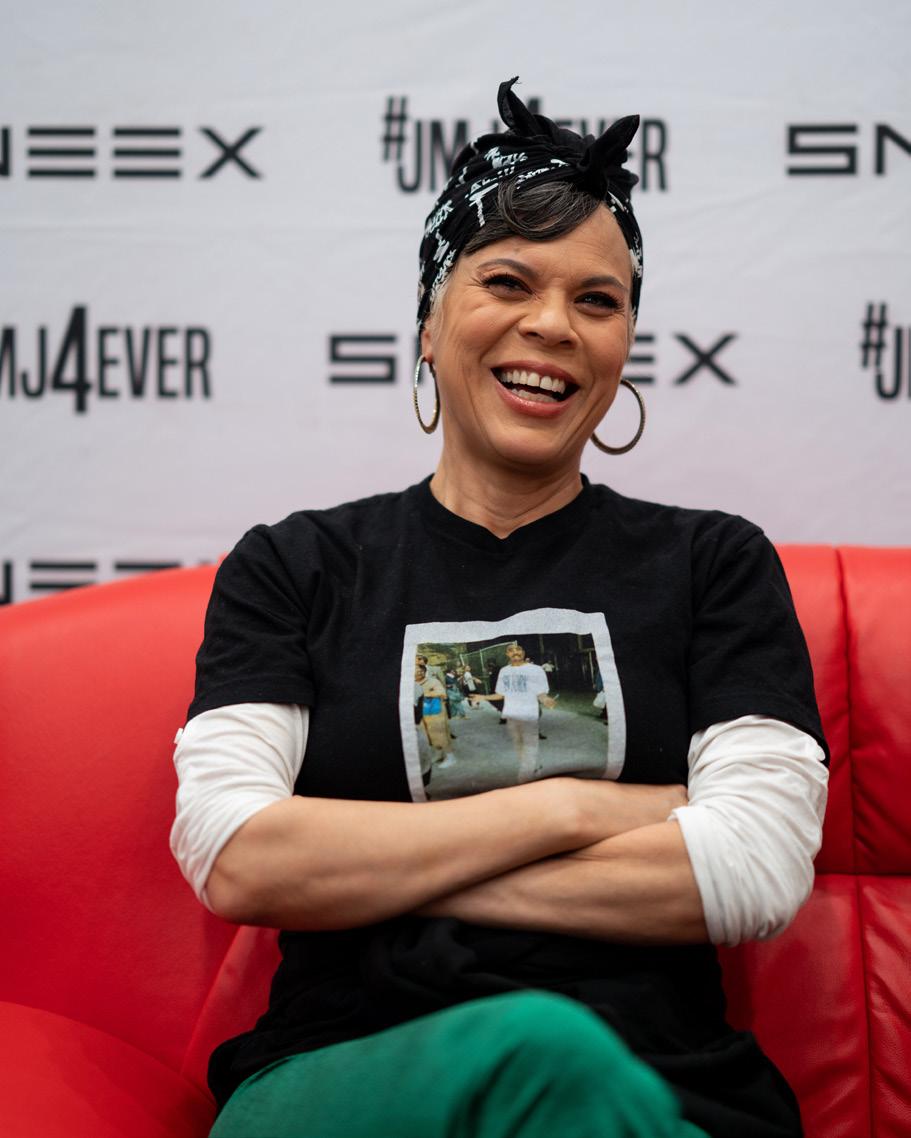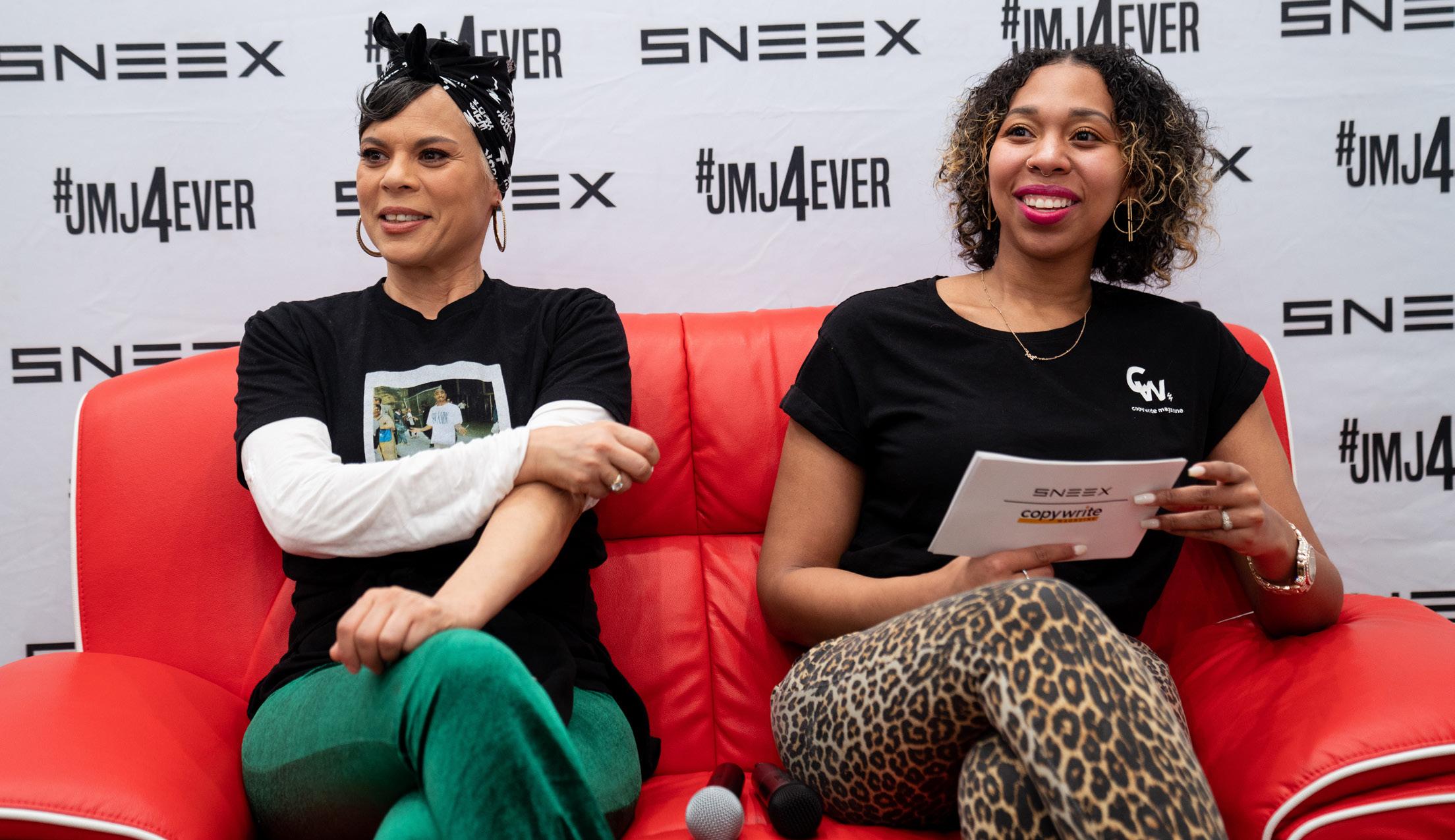
7 minute read
THE FUTUREbeen female
CRACK OPEN THE FASHION HISTORY BOOKS. IT’S TIME TO INSERT April Walker
Not too long ago (but what feels like a lifetime before) we received an email that April Walker, the “Sacagawea of Urban Fashion” would be coming back to our city for a few appearances and of course to drop some “Walker Gems”. A few months before that we had seen a showing of the documentary, The Remix: Hip Hop X Fashion, where we were enlightened by the cultural impact of her fashion career. Our new knowledge of this Brooklyn raised fashion icon who started Walker Wear, inspired us to dig deeper into the contributions of women of color in the fashion industry and entrepreneurship. Noting that many of those nostalgic hip hop “trends” we keep going back to, reimagining and are nostalgic of, came from the genius of women like Walker. But beyond April’s skills in fashion, she is an author, a brand consultant, and what we would call a “social advocate”. Though CopyWrite was honored to have moderated two public Q&A interviews with April, it was the 15-minute chat we had in the lobby outside of Sneex that reinvigorated some knowledge we already knew: “The Future Been Female”.
Advertisement
CW: “So we want to know more about your consulting firm? What exactly does the A. Walker Group do?
AW: “So A. Walker Group is a consulting company, a creative company. We work with Classic Media which is now owned by DreamWorks. . . we did designs with them. We’ve done everything from design to marketing to licensing. And we’ve worked as a consultant with footwear, with electronic companies, with fashion companies, with accessories, like handbag companies. So we’ve done everything from licensing deals for Wilsons Leather to international deals here with a design company called Money Clothing, they’re really dope, outta the UK. And we did their United States licensing deal, so we go on the gambit from design to licensing, depending on what the client needs.”
CW: “And is that where you kinda flipped after you stopped doing Walker Wear the first time?”
AW: “I took a brief break and I went into that part of it. I also did some design work for Makaveli when Tupac’s mother and sister wanted to do a line. And I did some ghostwriting then. So I’ve done a lot of things. Taking a break and a breather. . .I’m a serial entrepreneur—so I had a pet shop and an all natural pet treat company Called Walker Pets. Yeah, in Fort Greene Brooklyn, shout out to Brooklyn.”
Even though some of April’s ideas have been more successful than others, her reflection of those attempts was not a waste. AW: “You see an opportunity, you see something coming, sometimes it’s good to get in on the ground. And sometimes it’s not, but doing it makes the difference, you have no regrets, at least you tried.”
The attempt is half the struggle. With Corporate America biting at Hip Hop culture and several other design companies pulling at some of Walker's original designs, she pulled herself away from her 1990’s fashion line. No stranger to the plight of adaptation and cultural shift with a few new entrepreneurial perspectives under her belt, she made a comeback with her Walker Wear relaunch that embodies all the needs of heritage and lifestyle fashion.
CW: “We see a lot out now with urban fashion and hip hop fashion, a lot of appropriation, to the stylings, imagery and all of that. What is your take on appropriation of Urban culture, and Hip Hop culture, and all that stuff that comes with it?
With a deep pause, she looked up and said . . .
AW: “I think that it’s a question that’s—it’s not new. So it’s a hard question for me. I think now, with social media it’s great because it gives people an opportunity to have a conversation about it. But we have been dealing with this since forever. And I think that we are a resilient people, and we are innovative and creative people. So that will always be the case of the originator and the copycatter. It’s just up to us as a people to support the originators right? So I think that when we learn how to foster our own community growth through the creativity and all the jewels we share. Here’s what I think, that the more important question to the


conversation is we create so much magic every day, and then we give it away? And then we actually let them take it, regurgitate it, and spit it back to us, and we stand in line and kill each other over it, to buy what is already—we created. And so that’s really the main thing. I think that’s where the work needs to be done. Because we wouldn’t even care if they were copycattin’ because we’d be supporting our own. Does that make sense?”
CW: “Yeah that makes perfect sense.”
AW: “And I’m not sayin’ there aren’t those, and we don’t have communities. I just left Sherman Phoenix today which is a great example of what I’m talking about in fostering our own creativity and building community. But I think that when we learn collective economics we won’t have those holes, or those worries, worry about those gaps, you know, we won’t have those existing problems like that, because we would have this together right? Cuz when it’s like this (she gestured space between her fingers) I can get between those to make this weaker. But when it’s like this (she held her hand up in a tight fist)—”
CW: “When we’re together, it’s harder.”
We were about to move on to the next question but she stopped us, compelled that there was more to be said.
AW: “Let me go right back to that—as far as appropriation, I think appropriation—there’s a difference between appreciation and appropriation. So, I think appropriation is wrong, especially when you’re not giving credit. I don’t mean credit, I mean I need it to be a market share, in business, in a revenue structure. That’s what I think people need instead of, like I’m paying you mine, but I’m taking your style and everything you created and I’m not giving you anything but saying thank you. You know what I mean? That’s not a real thank you. Besides, how do we break bread together if you wanna do that? But I think that, yeah I think appropriation and appreciation are two different things. And I think that we have the control over appropriation if we want to redirect that we can change it to our own.”
April’s theory of collective economics is something we want to pay a little more attention to. Though many people in the urban community have used this same type of rhetoric, it has drastically been rekindled in the impact of the recent 2020 protest for racial and social equality. “Buy Black”, “Shop Local”, “Support Women-Owned Business” are all hashtags and call to action s the reinvigorate communities that have long been disenfranchised by appropriation that many of us willingly buy into out of convenience and years of media conditioning. Like Walker asserted, if we collectively control the appropriation narrative and all the other intricacies that come with it, maybe we can collectively turn it into viable gain.
CW: “Hip hop can be seen as super political, it also can be seen as social. Do you think they have become one in the same, and what is your position on hip hop culture being political or social?”
AW: “ I think it’s both. Right. I think hip hop reflects a lot of socio-economic times, and it reflects how we feel inside, in our environment, and what’s going on around us. It’s a voice often of the voiceless and people that aren’t, don’t have the medium or the power to talk about the issues going on in the communities, so they’re talking. And you can also hear the ills of society within hip hop, right? When we’re off balance. Like you know, you can hear what’s going on right now in this day and time. You know like...So I think it’s no different than rock ’n’ roll, in that sense of like...When I say rock ’n’ roll, rock ’n’ roll in the with means to like sex and guns, that’s what’s pushed. But I think hip hop is really more than that. And I think that we just have to dig through the crates in order to see it. Because there’s a lot of good, I mean I think Rhapsody should have definitely won this year for what she did, you know,



